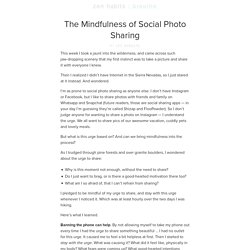

The Psychology of Social Media. What would happen if you were to “like” everything you saw on social media?

The developer Rameet Chawla found out when he built a script that liked every photo that passed through his Instagram feed. He grew his followers by about 30 a dayHe got invited to more partiesHe got stopped on the street by people who recognized him from InstagramHe got message after message from friends encouraging him to post more. He said it was “almost like they were frustrated, like they were longing for something to like in return.” The likes, comments and posts we share on social media can often seem inconsequential, but they matter.
They tap into some of the very elements that make us human, our addictions, desires, anxieties and joys. What if we could understand the psychology of social media and use that knowledge to bring customers closer, give them more of what they want, and create better relationships? How to listen: iTunes | Google Play | SoundCloud | Stitcher | RSS Dopamine Oxytocin Or … tweet. Why? 7 Social Media Psychology Studies That'll Make Your Marketing Smarter. One of my favorite things about social media is that it’s still such a young and new form of communication.

It feels too early to take anything as a given, so we’re all experimenting, testing and learning together. Every day seems to bring exciting new studies as research shows us more about how social media is changing the way we relate to one another, share information and even form our identities. I’ve been collecting a few of these studies and thinking over how they might relate to making us all better marketers (and hopefully better people, too).
I thought I would share them with you today. Here are the major findings of 7 social media psychology studies that will make your marketing smarter. 1. Most of us are familiar with that slightly uncomfortable feeling you get before you publish something new to the world—we’ve even written about it here. Sometimes the feeling leads to a creative breakthrough. 2. In other words: The good news? 3. 4. 5. 6. But why? 15 Psychological Studies That Will Boost Your Marketing. How does your audience decide what it wants to click, share, favorite, and purchase?

Understanding a bit of behavioral psychology can go a long ways toward a better understanding of your audience and why they do the things they do on social media and on your website. There’s tons here for marketers to discover, and the psychology of human interaction can lead to some quick wins in the way you compose your social media updates and communicate online. I’ve collected 15 of my favorite psychological studies and how they might relate to what we all do online. I’d love for you to take a look and let me know what you think! 15 Psychological Studies for Marketers to Know 1. When we own something, we tend to value it more highly. The research: A study at Duke University found that students who had won basketball tickets valued the tickets at $2,400. Marketing takeaway: Your customers attribute a higher value to things they already own. Social Proof: 18 Incredible Ideas to Boost Your Brand Image on Social Media. Science plays a key role in marketing, especially the science of psychology.

We have written about the 15 psychological principles in marketing and studied seven social media psychological research. This time, we’d love to dive deeper into one of the most powerful and prominent psychological phenomena… Social proof. The use of social proof can be found in many areas of both offline and online marketing. In this post, we’ll focus on the use of social proof on social media to boost your marketing effectiveness. Let’s get started! 6 Types of Social Proof Before we go through the strategies, let’s go through what social proof is and the science behind it. Social proof is a psychological phenomenon where people assume the actions of others in an attempt to reflect correct behavior for a given situation. On top of that, we often make judgments based on our overall impression of someone — A.K.A. the halo effect (named by psychologist Edward Thorndike). 1.
Example: 2. 3. Social Psychology. Sociology of Social Media.
The Mindfulness of Social Photo Sharing. By Leo Babauta This week I took a jaunt into the wilderness, and came across such jaw-dropping scenery that my first instinct was to take a picture and share it with everyone I knew.

Then I realized I didn’t have Internet in the Sierra Nevadas, so I just stared at it instead. And wondered. I’m as prone to social photo sharing as anyone else. I don’t have Instagram or Facebook, but I like to share photos with friends and family on Whatsapp and Snapchat (future readers, those are social sharing apps — in your day I’m guessing they’re called Shizap and FlooPowder). But what is this urge based on? As I trudged through pine forests and over granite boulders, I wondered about the urge to share: Why is this moment not enough, without the need to share?